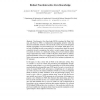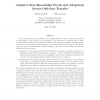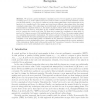80 search results - page 1 / 16 » Zero-knowledge from secure multiparty computation |
AFRICACRYPT
2009
Springer
14 years 4 months ago
2009
Springer
Abstract. We present a simple zero-knowledge proof of knowledge protocol of which many protocols in the literature are instantiations. These include Schnorr’s protocol for provin...
CRYPTO
2001
Springer
14 years 1 months ago
2001
Springer
Abstract. Non-Interactive Zero Knowledge (NIZK), introduced by Blum, Feldman, and Micali in 1988, is a fundamental cryptographic primitive which has attracted considerable attentio...
TCC
2009
Springer
14 years 10 months ago
2009
Springer
In the setting of secure computation, a set of parties wish to securely compute some function of their inputs, in the presence of an adversary. The adversary in question may be st...
IACR
2011
12 years 9 months ago
2011
Abstract. In Asiacrypt 2010, Groth constructed the only previously known sublinearcommunication NIZK argument for circuit satisfiability in the common reference string model. We p...
CRYPTO
2012
Springer
11 years 11 months ago
2012
Springer
We propose a general multiparty computation protocol secure against an active adversary corrupting up to n−1 of the n players. The protocol may be used to compute securely arithm...



